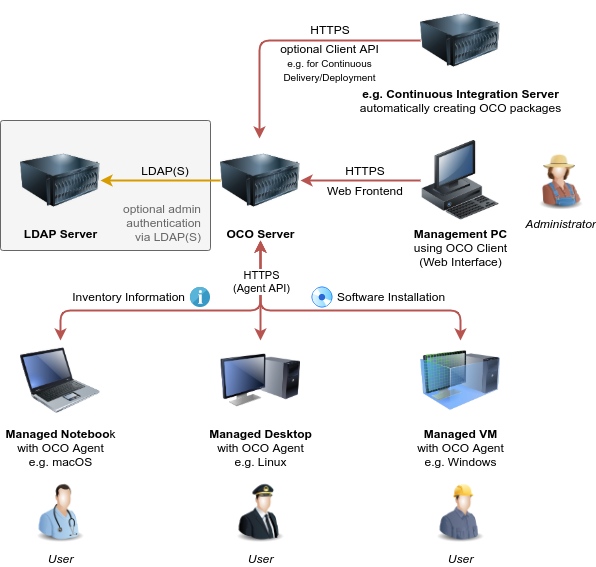Self Hosted / On Premise Desktop and Server Inventory, Management & Software Deployment
The Open Computer Orchestration (OCO) project enables IT administrators to centrally manage Linux, macOS and Windows machines using a comfortable web interface. It provides software deployment features, a user-computer logon overview, lists software packages installed on each computer ("recognised software") and features a fine-grained permission/role system.
It focuses on easy usability (UI/UX), simplicity (assessable code with minimal external dependencies) and performance (you can manage many computers with minimal server resources).
These features allow you to roll out any new software or updates (patch management) - just create an OCO package and distribute it to your clients. You can track progress and view the results (exit code and command output) of every software job. Custom reports let you to get even more out of your data.
The OCO server provides the Agent API (used to communicate with the OCO agent), the Client API (can be used by admins to automate workflows, e.g. for Continuous Integration/Delivery/Deployment) and the admin web frontend for the OCO project. On the web frontend you can view computer details and configure software deployment jobs. It can be installed on any Linux distribution. Data is stored in a MariaDB database.
- Software
- any Linux Distribution
- MariaDB Database Server
- Apache2 Web Server
- PHP 7.3 or newer
- Hardware Recommendations for ~600 Managed Computers
- 4 CPU cores
- 8GB RAM
- 20GB HDD + storage for your packages, depending on what you want to deploy
- at least Gigabit Ethernet, 10G recommended
- for WOL & OS installation via network: network card in every network where your client computers are
- Chromium-based Web Browser (Chrome/Chromium v80 or newer, Opera etc.)
- Firefox (v80 or newer)
- (optional) OCO Client Extensions (for opening RDP, VNC, SSH sessions from the web interface)
- please refer to OCO Agent
Please open a pull request for any improvements you like!
For translators: the language files are in lib/Language/<langcode>.php. There you can insert new files with your translations or correct existing ones. Thank you very much!
Please read the documentation in the /docs folder.
Quick Links:
If you like this project, please do not forget to star the GitHub repo.
The Open Computer Orchestration Project is open source, which means you have the freedom to view the source code, report issues and submit improvements on GitHub, which are very welcome. However, a license is required if you want to manage more than 20 computers with this system. Please buy the appropriate licenses here to support further development.
You need support or specific adjustments for your environment? You can hire me to extend OCO to your needs or to write custom reports etc. Please contact me if you are interested.




